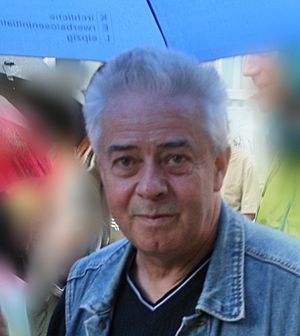Christian Führer facts for kids
Quick facts for kids
Christian Führer
|
|
|---|---|

Christian Führer in 2008.
|
|
| Born | 5 March 1943 Leipzig, Germany
|
| Died | 30 June 2014 (aged 71) Leipzig, Germany
|
| Nationality | German |
| Occupation | Pastor |
| Known for | Leading figure during the Monday demonstrations in East Germany |
Christian Führer (born March 5, 1943 – died June 30, 2014) was a brave Protestant pastor in Germany. He became famous for leading peaceful protests in 1989. These protests, called the Monday demonstrations in East Germany, helped bring about the end of East Germany and led to German reunification in 1990.
Contents
Who Was Christian Führer?
Christian Führer grew up in a place called Langenleuba-Oberhain in Saxony, Germany. He studied theology (the study of religion) at the University of Leipzig from 1961 to 1966.
After his studies, he worked as a pastor in a town called Colditz. In 1980, he moved to Leipzig and became the pastor of the famous Nikolaikirche (St. Nicholas Church). He worked there until he retired in 2008.
Starting the Peace Prayers
In 1980, Christian Führer helped start special "peace prayers" (called Friedensgebete in German). These prayers were part of a protest by young Protestant groups. They were held to speak out against the Cold War.
Starting on September 20, 1982, these peace prayers happened every Monday at the Nikolai Church in Leipzig. They focused on bringing peace during the Cold War.
Speaking Out for Peace
Christian Führer continued to organize events for peace. In 1987, he helped arrange a special walk for peace. In 1988, he led prayers for people who had been arrested during other protests.
On February 19, 1988, he gave an important speech at the Nikolai Church. It was titled Living and Staying in the GDR (Leben und Bleiben in der DDR). Many people who wanted change in East Germany came to hear him speak. This speech was a key moment for those resisting the government at the time.
A Peaceful Revolution Begins
In early 1989, the East German government, especially its secret police known as the Stasi, tried to stop the Monday Peace Prayers. They blocked roads and arrested people near the church. But their efforts failed. More and more people came to the prayers each week.
On October 9, 1989, a large number of soldiers, police, and Stasi officers gathered outside the church. About 1,000 members of the ruling political party were even ordered to go inside the church.
The Power of "No Violence!"
As the peace prayers ended that day, a special message was read aloud. It was written by famous people like Kurt Masur and others, who became known as The Leipzig Six. This message asked everyone attending to remain peaceful and not use any force.
After the prayers, about 70,000 people marched in a demonstration. They followed the message and remained completely nonviolent.
The powerful slogan "No Violence!" (Keine Gewalt!) was then used by over 300,000 people in later demonstrations. Because of this commitment to peace, the entire East German revolution remained peaceful. This led to the fall of the Berlin Wall and the reunification of Germany.
After the Wall Came Down
After Germany was reunified in 1989, Christian Führer continued his work for others. He became a strong supporter for people who were unemployed. He helped start the "Church Initiative for the Jobless, Leipzig."
In 2004, he again organized Monday demonstrations. These protests were against new government changes that affected welfare support for people. He also continued to hold his regular Peace Prayers.
Christian Führer held his last service at the Nikolai Church on March 30, 2008, before he retired.
His Final Years
Christian Führer passed away on June 30, 2014, at the age of 71. He died from breathing problems.
Awards and Recognition
Christian Führer received many awards for his important work:
- 1991: Theodor-Heuss-Prize (with others)
- 2002: Johann-Philipp-Palm-Prize
- 2004: Goldene Henne, called Held der Wende (Hero of the Change)
- 2005: Peaceprize of Augsburg (with Mikhail Gorbachev)
Learn More
Related Topics
- Die Wende ("The Change"), which was the start of German reunification
- Berlin Wall
- History of Germany since 1945
Videos and Books
- 2002 The Burning Wall (a film)
- 2007
Where We Got This Information
- BBC UK, Leipzig revives protest tradition, March 17, 2003
- New York Times, A Clergyman of the Streets Leaves His Historic Pulpit, January 12, 2008
- Rev. Dr. Ian Ritchie, CHRISTIANITY AND CULTURE, Fall of Berlin Wall a Blessing of Faith
- Evangelic Church Saxony, Chronicle of GDR 1981–1990, German
- Christian Dietrich und Uwe Schwabe (Hrsg. im Auftrag des Archives Bürgerbewegung e.V. Leipzig): FREUNDE UND FEINDE. Friedensgebete in Leipzig zwischen 1981 und dem 9. Oktober 1989. Dokumentation. Mit einem Vorwort von Harald Wagner, Leipzig, Evangelische Verlagsanstalt, 1994, ISBN: 3-374-01551-4.
- Interview with Prof. Hans-Werner Sinn, President of the IFO Institute for Economy Research, German
- Kirchliche Erwerbsloseninitiative Leipzig (Church Initiative for the Jobless, Leipzig)
 | Kyle Baker |
 | Joseph Yoakum |
 | Laura Wheeler Waring |
 | Henry Ossawa Tanner |

